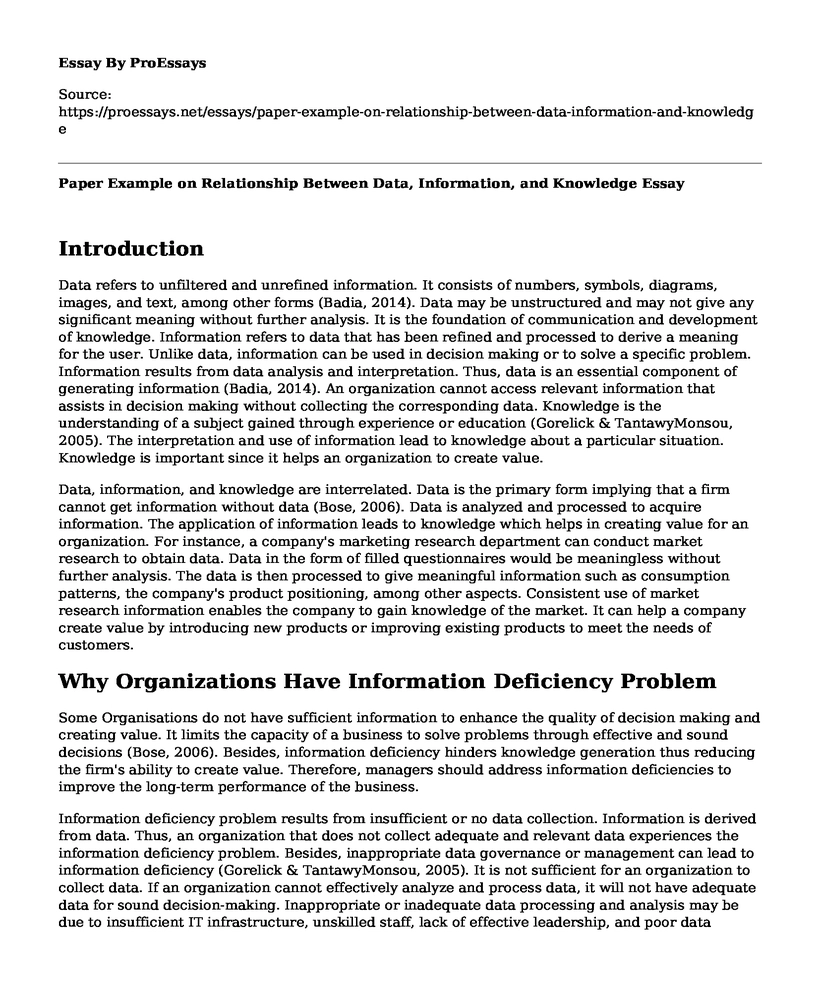Introduction
Data refers to unfiltered and unrefined information. It consists of numbers, symbols, diagrams, images, and text, among other forms (Badia, 2014). Data may be unstructured and may not give any significant meaning without further analysis. It is the foundation of communication and development of knowledge. Information refers to data that has been refined and processed to derive a meaning for the user. Unlike data, information can be used in decision making or to solve a specific problem. Information results from data analysis and interpretation. Thus, data is an essential component of generating information (Badia, 2014). An organization cannot access relevant information that assists in decision making without collecting the corresponding data. Knowledge is the understanding of a subject gained through experience or education (Gorelick & TantawyMonsou, 2005). The interpretation and use of information lead to knowledge about a particular situation. Knowledge is important since it helps an organization to create value.
Data, information, and knowledge are interrelated. Data is the primary form implying that a firm cannot get information without data (Bose, 2006). Data is analyzed and processed to acquire information. The application of information leads to knowledge which helps in creating value for an organization. For instance, a company's marketing research department can conduct market research to obtain data. Data in the form of filled questionnaires would be meaningless without further analysis. The data is then processed to give meaningful information such as consumption patterns, the company's product positioning, among other aspects. Consistent use of market research information enables the company to gain knowledge of the market. It can help a company create value by introducing new products or improving existing products to meet the needs of customers.
Why Organizations Have Information Deficiency Problem
Some Organisations do not have sufficient information to enhance the quality of decision making and creating value. It limits the capacity of a business to solve problems through effective and sound decisions (Bose, 2006). Besides, information deficiency hinders knowledge generation thus reducing the firm's ability to create value. Therefore, managers should address information deficiencies to improve the long-term performance of the business.
Information deficiency problem results from insufficient or no data collection. Information is derived from data. Thus, an organization that does not collect adequate and relevant data experiences the information deficiency problem. Besides, inappropriate data governance or management can lead to information deficiency (Gorelick & TantawyMonsou, 2005). It is not sufficient for an organization to collect data. If an organization cannot effectively analyze and process data, it will not have adequate data for sound decision-making. Inappropriate or inadequate data processing and analysis may be due to insufficient IT infrastructure, unskilled staff, lack of effective leadership, and poor data governance structures, among other factors. The problem can also arise from inadequate capital to acquire appropriate infrastructure and establish the necessary systems. Financial requirements make small and medium firms more susceptible to the problem than large firms.
Organizations can overcome information deficiency by investing in IT infrastructure that facilitates effective data analysis and processing. If an organization acquires appropriate IT infrastructure, it can process all kinds of data to obtain relevant information. An organization can also reduce information deficiency by employing qualified data analysts. This will improve the quality of data analysis thus facilitating the generation of accurate information for managerial decisions and knowledge acquisition purposes (Gorelick & TantawyMonsou, 2005). All these changes require the support of the management. It is essential for the executive to understand the benefits of proper IT and data governance structures. Small and medium firms can consider cheaper IT services such as cloud services, among other alternatives.
References
Badia, A. (2014). Data, information, knowledge: An information science analysis. Journal Of The Association For Information Science And Technology, 65(6), 1279-1287. doi: 10.1002/asi.23043
Bose, R. (2006). Understanding management data systems for enterprise performance management. Industrial Management & Data Systems, 106(1), 43-59. doi: 10.1108/02635570610640988
Gorelick, C., & TantawyMonsou, B. (2005). For performance through learning, knowledge management is the critical practice. The Learning Organization, 12(2), 125-139. doi: 10.1108/09696470510583511
Cite this page
Paper Example on Relationship Between Data, Information, and Knowledge. (2022, Jun 05). Retrieved from https://proessays.net/essays/paper-example-on-relationship-between-data-information-and-knowledge
If you are the original author of this essay and no longer wish to have it published on the ProEssays website, please click below to request its removal:
- Hacking Ethical Dilemma and Financial Security and Moral Concern Essays
- Digital Marketing vs Traditional Marketing Paper Example
- Research Paper on Transition of Bookkeeping From Paper to Electronic Data
- Article Analysis Essay on Wasting Time on the Internet and Is Google Making Us Stupid
- Paper Example on Maximizing Decision Making With Decision Support Systems
- Essay Sample on Gamification: Enhancing Learning with Fun and Excitement
- Essay Example on Computer Security Policies







